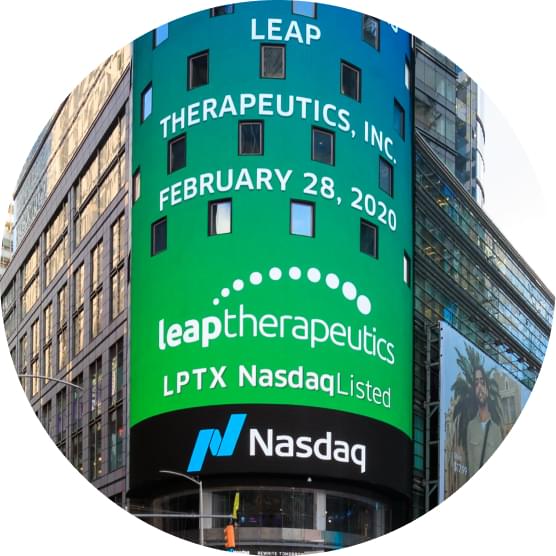Leap Presents Positive Clinical Results for the Combination of DKN-01 plus Keytruda® and Provides DKN-01 Program Update
"Gastric and gastroesophageal junction cancers represent a major global cancer burden with significant unmet needs, particularly in patients with advanced disease. Outside of rare microsatellite instable tumors and EBV-associated cancers the response rates to immune checkpoint inhibitors are low and median progression free survival remains short, in the range of 6-8 weeks. Oncologists and patients are eager for new therapeutic combinations and biomarkers to help predict patients most likely to benefit from a given treatment," stated
"The responses and early survival data seen in
Key Findings from KEYNOTE-731 DKN-01 plus Keytruda Combination
The esophagogastric cancer clinical trial is a multipart study of DKN-01 as a monotherapy and in combination with paclitaxel or pembrolizumab. Sixty-three patients were treated with DKN-01 plus Keytruda combination therapy across all arms and dose groups of the study. Fifty-three patients had not received prior PD-1/PD-L1 therapy, and ten patients were refractory to PD-1/PD-L1 therapy. All of the patients enrolled had tumors that were microsatellite stable or unknown. Patients in the study were heavily pretreated having had received one to five prior lines of therapy, with nearly 64% having received a prior taxane regimen, 37% having received prior ramucirumab, and 24% having received prior trastuzumab. The combination therapy was well tolerated with no new safety signals.
The combination of DKN-01 and Keytruda in GEJ/GC patients demonstrated improved outcomes in patients whose tumors are
PD-L1 Combined Positive Scores (CPS) did not predict efficacy on the combination of DKN-01 plus Keytruda. In multi-variate analysis,
Among the six GEJ/GC patients who were refractory to PD-1/PD-L1 therapy, three
DKN-01 Clinical Perspectives Conference Call and Webcast
To access the conference call, please dial (866) 589-0108 (US/Canada Toll-Free) or (409) 231-2048 (international) and refer to conference ID 3571417. The presentation will also be webcast live and will be available under "Events & Presentations" in the Investor section of Leap's website, https://www.leaptx.com/program-webcasts. A replay of the webcast will be available on Leap's website shortly after the event and will be available for a limited time.
About
KEYTRUDA® is a registered trademark of
FORWARD-LOOKING STATEMENTS
This press release contains forward-looking statements within the meaning of Section 27A of the Securities Act of 1933, Section 21E of the Securities Exchange Act of 1934 and the Private Securities Litigation Reform Act of 1995, which involve risks and uncertainties. These statements include statements regarding Leap's intended use of proceeds from the offering, Leap's expectations with respect to the development and advancement of DKN-01, TRX518, and other programs, including the initiation, timing and design of future studies, enrollment in future studies, business development, and other future expectations, plans and prospects. Leap has attempted to identify forward looking statements by such terminology as ''believes,'' ''estimates,'' ''anticipates,'' ''expects,'' ''plans,'' ''projects,'' ''intends,'' ''may,'' ''could,'' ''might,'' ''will,'' ''should,'' or other words that convey uncertainty of future events or outcomes to identify these forward-looking statements. Although Leap believes that the expectations reflected in such forward-looking statements are reasonable as of the date made, forward-looking statements are subject to known and unknown risks, uncertainties and other factors that could cause actual results to differ materially from our expectations. Such risks and uncertainties include, but are not limited to: the accuracy of our estimates regarding expenses, future revenues, capital requirements and needs for financing; the ability to complete a financing or form business development relationships to fund our expenses; the outcome, cost, and timing of our product development activities and clinical trials; the uncertain clinical development process, including the risk that clinical trials may not have an effective design or generate positive results; our ability to obtain and maintain regulatory approval of our drug product candidates; our plans to research, develop, and commercialize our drug product candidates; our ability to achieve market acceptance of our drug product candidates; unanticipated costs or delays in research, development, and commercialization efforts; the applicability of clinical study results to actual outcomes; the size and growth potential of the markets for our drug product candidates; our ability to continue obtaining and maintaining intellectual property protection for our drug product candidates; and other risks. Detailed information regarding factors that may cause actual results to differ materially will be included in
CONTACT:
Chief Financial Officer
617-714-0360
donsi@leaptx.com
Investor Relations
212-600-1902
heather@argotpartners.com

![]() View original content to download multimedia:http://www.prnewswire.com/news-releases/leap-presents-positive-clinical-results-for-the-combination-of-dkn-01-plus-keytruda-and-provides-dkn-01-program-update-300896687.html
View original content to download multimedia:http://www.prnewswire.com/news-releases/leap-presents-positive-clinical-results-for-the-combination-of-dkn-01-plus-keytruda-and-provides-dkn-01-program-update-300896687.html
SOURCE




